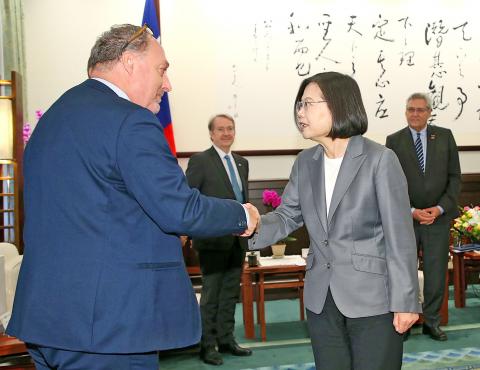President Tsai Ing-wen (蔡英文) yesterday received a Dutch parliamentary and think-tank delegation, expressing the hope that it would help push for the signing of a bilateral investment agreement (BIA) between Taiwan and the EU.
The delegation included Dutch House of Representatives member Henk Krol, Dutch Senator Martine Baay-Timmerman, Hague Centre for Strategic Studies director of political affairs Han ten Broeke, Netherlands Institute of International Relations senior associate fellow Rene Cuperus and Netherlands Trade and Investment Office Representative Guy Wittich.
Tsai thanked the guests for the passage of a motion by the Dutch House of Representatives earlier this month in support of Taiwan’s international participation.

Photo: CNA
She cited the opening of the National Kaohsiung Center for the Arts (Weiwuying) last year as an example of cooperation between Taiwanese and Dutch architects.
Over the past three years, bilateral cooperation has been generating consistent results, she said.
“In addition to establishing a mechanism for vice ministerial-level dialogue on economic affairs, this year we have signed a customs mutual assistance agreement and an MOU [memorandum of understanding] on science and technology cooperation,” she added.
The Netherlands is not only a supporter of Taiwan’s international participation, but also its “No. 1 investor,” she said.
Three of the 13 foreign firms that signed letters of intent to invest in Taiwan at the Taiwan Business Alliance Conference in Taipei on Oct. 7 were from the Netherlands, she said.
To provide Dutch manufacturers with “better protections,” Taiwan has been seeking to sign a BIA with the EU, she said.
“Signing a BIA would help safeguard the interests of Dutch businesses,” she said.
Through the channels available to them, she hopes the delegation members would urge the Dutch government to “as a member of the EU, lend us its fullest possible support,” she said.
Taiwan “stands at the heart of the frontline of democracy in the Indo-Pacific [region],” she added.
She hopes that the delegation’s visit would promote more cooperation between Taiwan and the Netherlands in the areas of information security and geopolitics, she said.
At a public hearing on EU-Taiwan trade relations in Brussels in February, Peter Berz — European Commission official responsible for trade links with the Far East — said the union does not rule signing a bilateral investment agreement with Taiwan, despite its adherence to the so-called “one China” policy.
Additional reporting by CNA

PRAISE: Japanese visitor Takashi Kubota said the Taiwanese temple architecture images showcased in the AI Art Gallery were the most impressive displays he saw Taiwan does not have an official pavilion at the World Expo in Osaka, Japan, because of its diplomatic predicament, but the government-backed Tech World pavilion is drawing interest with its unique recreations of works by Taiwanese artists. The pavilion features an artificial intelligence (AI)-based art gallery showcasing works of famous Taiwanese artists from the Japanese colonial period using innovative technologies. Among its main simulated displays are Eastern gouache paintings by Chen Chin (陳進), Lin Yu-shan (林玉山) and Kuo Hsueh-hu (郭雪湖), who were the three young Taiwanese painters selected for the East Asian Painting exhibition in 1927. Gouache is a water-based

Taiwan would welcome the return of Honduras as a diplomatic ally if its next president decides to make such a move, Minister of Foreign Affairs Lin Chia-lung (林佳龍) said yesterday. “Of course, we would welcome Honduras if they want to restore diplomatic ties with Taiwan after their elections,” Lin said at a meeting of the legislature’s Foreign Affairs and National Defense Committee, when asked to comment on statements made by two of the three Honduran presidential candidates during the presidential campaign in the Central American country. Taiwan is paying close attention to the region as a whole in the wake of a

A magnitude 4.1 earthquake struck eastern Taiwan's Hualien County at 2:23pm today, according to the Central Weather Administration (CWA). The epicenter of the temblor was 5.4 kilometers northeast of Hualien County Hall, at a depth of 34.9 km, according to the CWA. The earthquake's intensity, which gauges the actual effect of a temblor, was the highest in Hualien County, where it measured 2 on Taiwan's 7-tier intensity scale. The quake also measured an intensity of 1 in Yilan county, Taichung, Nantou County, Changhua County and Yunlin County, the CWA said. There were no immediate reports of damage or injuries.

OFF-TARGET: More than 30,000 participants were expected to take part in the Games next month, but only 6,550 foreign and 19,400 Taiwanese athletes have registered Taipei city councilors yesterday blasted the organizers of next month’s World Masters Games over sudden timetable and venue changes, which they said have caused thousands of participants to back out of the international sporting event, among other organizational issues. They also cited visa delays and political interference by China as reasons many foreign athletes are requesting refunds for the event, to be held from May 17 to 30. Jointly organized by the Taipei and New Taipei City governments, the games have been rocked by numerous controversies since preparations began in 2020. Taipei City Councilor Lin Yen-feng (林延鳳) said yesterday that new measures by